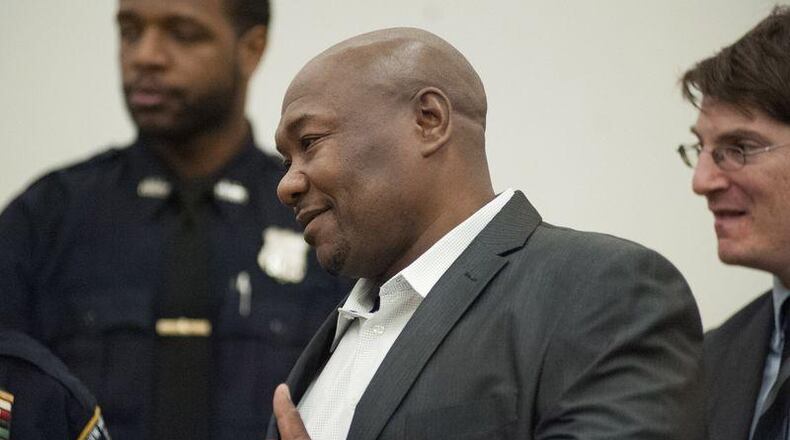Twenty years ago, Derrick Hamilton was at his lowest point: locked in solitary confinement for a murder he insisted he did not commit. Over the next two decades, he slowly crawled his way out of the belly of the beast.
He became a jailhouse lawyer, helping his fellow inmates appeal their convictions. Twenty-three years later, he finally persuaded prosecutors to throw out his own conviction, after an eyewitness recanted her testimony. Once free, he became an activist, toiling to get others he believed were wrongfully convicted out of jail.
Won $7 million settlement
Hamilton, 54, took on a new role recently in the long drama of his fight against injustice: a successful plaintiff. City officials in New York and New Haven, Connecticut, agreed Nov. 15 to pay him $7 million to settle a lawsuit he had filed against three police officers, accusing them of fabricating evidence against him.
One of those officers, Louis Scarcella, a retired New York detective, has emerged in recent years as a symbol of wrongful convictions, as numerous cases he handled have fallen apart.
"Everyone's life went on for 20 years. Mine stopped." — Derrick Hamilton, wrongfully convicted of murder in 1991
Under the terms of the agreement, reached on the eve of what would have been a trial in U.S. District Court in Brooklyn, Scarcella admitted no wrongdoing. He had been scheduled, like Hamilton, to testify at the trial.
For Hamilton, the payout, while substantial, was not the point. “It’ll help my family out financially,” he said. “It doesn’t settle what I went through.”
Hamilton added: “Everyone’s life went on for 20 years. Mine stopped.”
Convicted in 1992
In 1991, when he was 28 and living in New Haven, Hamilton was arrested by Scarcella and the local police, accused of having murdered a Brooklyn man, Nathaniel Cash, whom he had known when he lived in the borough.
The only eyewitness against him at his trial in state Supreme Court was Cash’s girlfriend, Jewel Smith, who had given conflicting accounts to police about Hamilton’s role in the killing.
Still, the jury convicted him, and Hamilton was sent away in 1992 to what soon became a series of upstate prisons.
He spent much of the next 23 years performing jailhouse legal work. He pored over trial transcripts, filing motions on behalf of other inmates and occasionally winning their appeals. At one point — in Attica Correctional Facility — he filed papers challenging his long stint in solitary confinement, claiming it was “cruel and unusual punishment.”
Witness changes testimony
In 2007, Smith went to authorities and asserted that Hamilton was innocent. Scarcella, she said, had coerced her into testifying against him. Eight years later, the Conviction Review Unit of the Brooklyn district attorney’s office asked a judge to toss out Hamilton’s guilty verdict. Prosecutors noted that Smith had been “unreliable, untruthful and incredible in her testimony.”
Credit: JOHN TAGGART
Credit: JOHN TAGGART
By that point, the district attorney’s office was two years into an expansive investigation of dozens of Scarcella’s former murder cases, looking into allegations that he had coerced other witnesses and had threatened people to get them to confess. That investigation, which is ongoing, has led to the release of 14 inmates and has resulted in the city and state paying tens of millions of dollars to settle lawsuits against Scarcella.
The district attorney’s office has, however, maintained that Scarcella has not committed any punishable conduct or broken the law.
Working to help others
Since becoming a free man, Hamilton has labored to overturn many convictions linked to Scarcella. Hamilton has worked with lawyers as a paralegal to investigate facts and has helped draft lawsuits and motions in support of new trials.
A few years ago, he founded a support group called Friends and Family of the Wrongfully Convicted with another former inmate, Sundhe Moses, who was also arrested by Scarcella and was ultimately freed.
The group met for a while at a restaurant in downtown Brooklyn, which Hamilton operated with Shabaka Shakur, a third man arrested by Scarcella and later exonerated.
The three former prisoners would sometimes appear at hearings where Scarcella was on the stand defending his work. They wore hats that said “Wrongfully Convicted.”
Credit: ANTHONY LANZILOTE
Credit: ANTHONY LANZILOTE
More recently, Hamilton has partnered with the Innocence Project in an effort to persuade the New York Police Department to change the way in which its officers conduct interrogations. He has also undertaken a project to organize former prison inmates to work together as a voting bloc for criminal justice reform.
On Tuesday, he was in court when a Brooklyn judge was scheduled to throw out the conviction of Eliseo Deleon in what will be the 15th exoneration linked to Scarcella’s detective work. Deleon spent 25 years in prison for a 1996 murder committed during a botched robbery in Clinton Hill. He has long maintained that Scarcella fabricated his confession.
“I know what it’s like to come home and have nothing — that’s why I’m going,” Hamilton said. “The guy who’s coming home, he needs to know he’s got a friend.”
About the Author
The Latest
Featured




